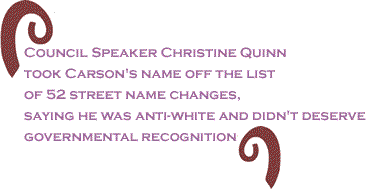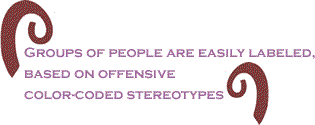
|
|||||||||||||||||||||
|
||||||||||
|
The current issue is always free to everyone If
you need the access available to a |
||||||||||
 |
||||||||||
"The press is so powerful in its image-making role, it can make a criminal look like he's the victim and make the victim look like he's the criminal. This is the press, an irresponsible press. If you aren't careful, the newspapers will have you hating the people who are being oppressed and loving the people who are doing the oppressing." - Malcolm X, Audubon Ballroom, December 13, 1964 Recently, the New York City Council rejected a measure that would have named a street in Brooklyn after the late activist Sonny Ababudika Carson. The measure - which failed in a vote along racial lines with 15 supporting it, 25 against and seven abstaining - would have named four blocks of Gates Avenue, in the predominantly Black neighborhood of Bedford-Stuyvesant, after Carson. The avenue currently takes its name from Horatio Gates, a Virginia slave owner and Revolutionary War general. Ultimately, the measure failed because New York Mayor Michael Bloomberg and Council Speaker Christine Quinn were against it. Bloomberg called renaming a Brooklyn street after Sonny Carson one of the worst ideas the council has ever considered. Quinn took Carson's name off the list of 52 street name changes, saying he was anti-white and didn't deserve governmental recognition. She also cited his boycott of Korean groceries in the 1980s, which came after allegations that a Black customer was mistreated at a store.
Carson, known as the "Mayor of Bed-Stuy," emerged from a violent past to become a community leader. He led anti-police brutality protests in the 1980s, fought for voting rights for ex-cons and shut down crack houses. He was instrumental in easing racial conflict in the Ocean Hill-Brownsville school empowerment crisis of the 1960s, and in naming streets in honor of Harriet Tubman, Marcus Garvey and Malcolm X. An ex-prisoner, Carson's life was dramatized in the 1974 film, "The Education of Sonny Carson." He died in 2002. His critics - who likely care little about the needs and concerns of Carson's Brooklyn community, much less visiting Bed-Stuy - have labeled him as a radical and an anti-white racist who helped to divide the city. Here we go again… Perhaps it is not so surprising that a billionaire mayor such as Bloomberg refuses to support the commemoration of an activist who championed the poor, the Black and the disenfranchised, and offended middle-class sensibilities by refusing to filter his message and make his narrative more palatable to a wider audience. Quinn - the city's first openly gay council speaker, who boycotted the Ancient Order of Hibernians for their policy against gays and lesbians marching in New York's St. Patrick's Day Parade - should know better. "We're not allowing the white power structure in New York to tell us who our heroes can be and who we can name our streets and parks after," said City Councilman and former Black Panther Charles Barron, who represents the East New York section of Brooklyn, where a park has been renamed after Carson. It should be noted that at Quinn's urging and with Bloomberg's approval, the council voted to name a street in honor of Al Jolson, who performed in blackface and uttered "mammy" in his Vaudeville routines.
A multitude of New York City streets, parks, squares and buildings are named after individuals with a history of racism and anti-Semitism. About 70 New York streets are named after slave owners. Houston Street is named for William Houstoun, founding father and wealthy Georgia plantation owner who owned slaves. Thomas Jefferson, who enslaved his own children, has a high school and a park named after him. A number of New York fixtures, including Stuyvesant Place, Stuyvesant Town and Stuyvesant High School, are named after Peter Stuyvesant, governor of New Amsterdam in the 1600s, who sought to exclude Jews from the colony. Corbin Place is the namesake of Austin Corbin, a real-estate developer who owned the Long Island Rail Road in the late 1880s. Corbin was a member of the American Society for the Suppression of Jews, and excluded Jews from his hotels. So, in light of all this, why the indignation over naming a piece of a street in honor of Sonny Carson? Words can have great potency. Groups of people are easily labeled, based on offensive color-coded stereotypes. This is true particularly with regard to criminalization, in the media, of people of color. Bogeymen are created in the process: Black extremist, militant, urban terrorist, Muslim terrorist, insurgent, street thug, Black wolf pack, Latino gang member, illegal alien, welfare queen. Furthermore, in this post-9/11 era, neo-McCarthyist landscape, it is convenient to label voices of dissent - those who refuse to go along with the program, those who were handed a script yet refused to read from it - as troublemaker, terrorist, un-American, or a threat to national security. The press is adept at labeling individuals it deems controversial and dangerous, particularly individuals who are change agents, have something to say, and are uncompromising in the way they say it. Malcolm X said it best during his legendary debate at Oxford: "They create images of a person who doesn't go along with their views, and they make certain that this image is distasteful, and that anything that that person has to say from there on in is rejected. This is a policy that has been practiced, pretty much, by the West." A few months later, following the bombing of his home, Malcolm X noted: "They take one little word out of what you say, ignore all the rest, and then begin to magnify it all over the world to make you look like what you actually aren't. And I'm very used to that." Malcolm, of course, was vilified in his day, labeled as a hatemonger and separatist, tracked by the U.S. government and ultimately neutralized. In recent years, his likeness has appeared on a U.S. postage stamp. Similarly, lest we forget, Martin Luther King was hated by many in his day. He was tagged as a Communist and troublemaker, and hounded by FBI head J. Edgar Hoover, who declared him "the most dangerous man in America, and a moral degenerate." Today, Dr. King has a national holiday. And Hoover, who figured prominently in the assassination of King and other African American heroes and freedom fighters, has a government building named after him. Meanwhile, the issue here is really larger than whether there is a street named after Sonny Carson or anyone else for that matter. The issue is self-determination. The real concern is whether people can select their own heroes, and whether people of color can do so in a city such as New York, where they are in the majority. Anything less is neocolonialism, or perhaps just the same old stuff. BC Columnist David A. Love is an attorney based in Philadelphia, and a contributor to the Progressive Media Project and McClatchy-Tribune News Service. He contributed to the book, States of Confinement: Policing, Detention and Prisons (St. Martin's Press, 2000). Love is a former spokesperson for the Amnesty International UK National Speakers Tour, and organized the first national police brutality conference as a staff member with the New York-based Center for Constitutional Rights. He served as a law clerk to two Black federal judges. Click here to contact Mr. Love. |
||||||||||
| June
21, 2007 Issue 234 |
|
| Printer Friendly Version in resizeable plain text format |
 |
 |
 |
| |
| |



































